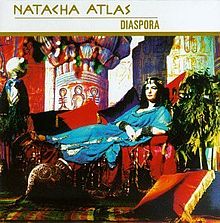The album by the Belgian-British musician Natacha Atlas is a frequently cited example of an attempt to sonify existential experiences of (post-)colonial life worlds: Migration, dispersion, foreignness, hybridity or tradition are just a few concepts that become audible and legible here, for example in the track also titled “Diaspora”. And not only with regard to the lyrics, which are mostly written in Arabic, but also on the musical levels, i.e. in the production of the sounds as well as the arrangement of the various tracks.
The term diaspora used here goes far beyond its original meaning as a designation of involuntary, multi-local exile of Jewish people and toward a general”(over)living as an ethnic or cultural community in a foreign land.”
A good overview of the history(s) of use and fashions of the concept is given here, for example, in the book by Diaspora. Eine kritische Begriffsgeschichte. by Ruth Mayer (2005).
The contemporary, electronic sound of Natacha Atlas, significantly co-produced by the London musicians’ collective Transglobal Underground , is not a music of protest explicitly calling for resistance or criticism of power. Rather, experiences are musically circled, quoted and aesthetically produced here. At this point we have briefly introduced a book that deals, among other things, with the description of that musical “encircling” of postcolonial knowledge.
Natacha Atlas, 1995: Diaspora
Ruth Mayer 2005: Diaspora. A brief history of terms. Bielefeld: Transcript.
If you don’t have a bookstore worth supporting near you, you can also buy the book from the alternative non-profit online bookstore links-lesen.de, which supports political projects with the profits. You can find the link to the book here.

